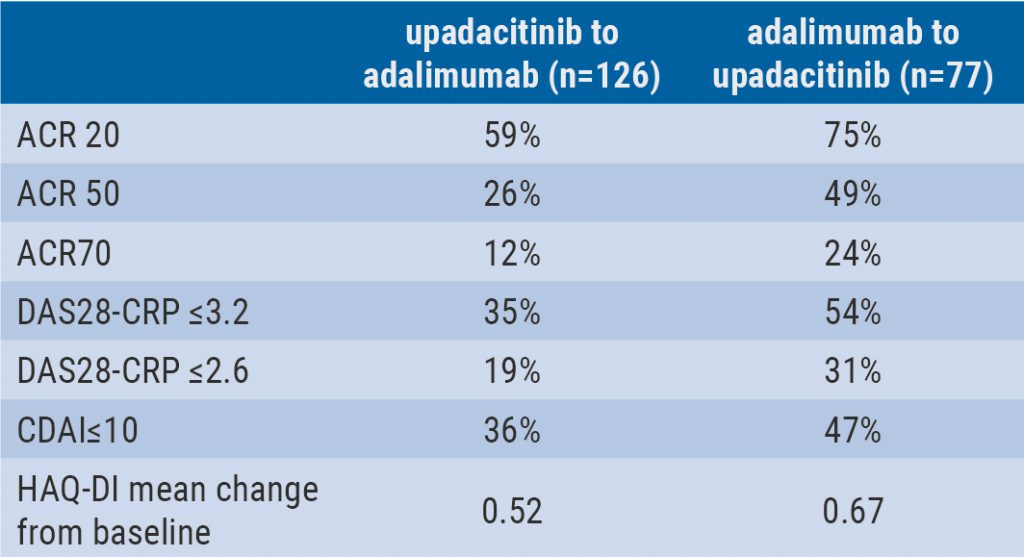The use of biosimilars has taken off in the past few years and is expected to increase further. The debate on the use of biosimilars and the switching from reference biologic medicines to biosimilars in rheumatology focuses on the clinical outcomes, including enhanced immunogenicity, compromised safety, or diminished efficacy for patients.
Dr Avouac et al. aimed to determine whether the successive switches from innovator infliximab to a first then second biosimilar increased the risk of immunogenicity during a 3-year observation period. This was done as a prospective, single-centre, observational study in France [1,2]. A total of 265 patients were included. Of these, 135 had axial spondyloarthritis, 64 had inflammatory bowel disease, 31 rheumatoid arthritis, 21 had psoriatic arthritis, 8 had uveitis, and 6 had other inflammatory diseases. These patients were all treated with the reference infliximab, then were switched to a biosimilar and followed for 3 years. Prior to the switch, 29 patients had anti-drug antibodies (ADAs). At year 2, 140 patients were switched to a second biosimilar infliximab, while 26 remained on the first biosimilar and 55 patients switched back to the reference product.
Among the 236 patients with no ADAs before the first switch, 20 developed ADAs during the observation period, corresponding to a rate of 3 per 100 patient-years. The mean time to ADA detection was 21.2 months.
Kaplan Meier Survival analysis showed that the number of patients that received biosimilars did not impact the development of ADAs. Among the 20 patients who developed new ADAs, 4 were taking the reference product at the time of detection, while 10 had been exposed to the first biosimilar only, and 6 had been exposed to both biosimilars. No predictive factors, including age, disease state, sex, body mass index, or concomitant drug therapy, were identified for immunogenicity.
The retention rate for biosimilar infliximab was 58% at the end of the observation period, including 131 patients treated with the second biosimilar and 23 patients treated with the first biosimilar. These real-world data may provide reassurance that switches to different biosimilars do not pose a risk with respect to increased immunogenicity.
- Avouac J, et al. Abstract OP0227. EULAR 2019
- Gisondi P, et al. Abstract P049. SPIN 2019.
Posted on
Previous Article
« Letter from the Editor Next Article
Integrated 10-year analysis confirms safety profile abatacept »
« Letter from the Editor Next Article
Integrated 10-year analysis confirms safety profile abatacept »
Table of Contents: EULAR 2019
Featured articles
Efficacy and safety of ixekizumab versus adalimumab in patients with PsA
Rheumatoid Arthritis
Cohort study shows improvement during 25 years of RA treatment
Filgotinib in RA patients with inadequate response or naïve to methotrexate
Clinical effectiveness of fenebrutinib in RA patients with methotrexate or TNFi failure
Short methotrexate stop is safe in patients with RA
Tofacitinib is safe according to real-world data analysis
Tapering of prednisone in RA patients who achieved low disease activity or remission with tocilizumab
Efficacy and safety of E6011 in RA patients with inadequate response to methotrexate
Preliminary efficacy and safety data of RG6125 in RA patients with an inadequate response to TNF inhibitors
Integrated 10-year analysis confirms safety profile abatacept
Switching among multiple infliximab biosimilars does not cause immunogenicity
Switch to sarilumab from adalimumab is efficacious and safe
Axial Spondyloarthritis
Treat-to-target approach emerging in axial spondyloarthritis
NSAIDs consumption is linked to patient-assessed disease activity and decreases with use of TNF inhibitors
Psoriatic Arthritis
Efficacy and safety of ixekizumab versus adalimumab in patients with PsA
Efficacy and safety of bimekizumab in patients with active PsA
Filgotinib is efficacious and safe in PsA
Ixekizumab improves signs and symptoms in TNFi-naïve PsA patients
Etanercept and methotrexate as first-line treatment in PsA
Unacceptable pain is common in patients with psoriatic arthritis
Osteoarthritis and Osteoporosis
Miscellaneous
Interstitial lung disease in rheumatic diseases and systemic sclerosis
Emapalumab in patients with macrophage activation syndrome
Support for tocilizumab use in giant cell arteritis
Related Articles
September 4, 2019
Switch to sarilumab from adalimumab is efficacious and safe

September 4, 2019
Switching upadacitinib and adalimumab is beneficial in refractory RA
© 2024 Medicom Medical Publishers. All rights reserved. Terms and Conditions | Privacy Policy
HEAD OFFICE
Laarderhoogtweg 25
1101 EB Amsterdam
The Netherlands
T: +31 85 4012 560
E: publishers@medicom-publishers.com

